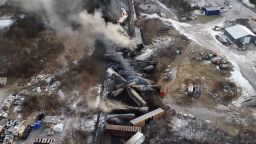More than two weeks after a toxic train wreck unleashed plumes of black smoke, contaminated the soil and fueled anxiety in East Palestine, Ohio, residents have reported a growing number of ailments – from rashes to nausea to trouble breathing.
Now, the state will open a health clinic Tuesday for residents who worry their symptoms might be linked to the February 3 derailment of a Norfolk Southern freight train and the subsequent release of the toxic chemical vinyl chloride.
And medical teams from the US Centers for Diseases Control and Prevention and the US Department of Health will be on the ground in Ohio this week, at the request of Ohio Gov. Mike DeWine. The teams will help assess what dangers might remain in the community of about 5,000 people.
US Environmental Protection Agency Administrator Michael Regan is headed back to East Palestine Tuesday to meet with residents and local and state officials, according to an EPA official with knowledge of the visit. Regan had visited the town last week.
It’s unclear what – if any – long-term health problems might arise from the train wreck, the subsequent inferno and the controlled release of vinyl chloride to help avert a catastrophic explosion.
So far, air quality tests from more than 530 homes have not detected any dangerous levels of contaminants, and no results have exceed the limits of residential air quality standards, the EPA said. The EPA is offering indoor air screenings for any resident within the evacuation zone, the EPA spokesperson said.
As for the water, the EPA said Monday that municipal water sample results “show no water quality concerns” in East Palestine. No vinyl chloride has been detected in any down-gradient waterways near the train derailment, EPA official Tiffani Kavalec told CNN last week.
The state of Ohio is leading water sampling efforts, an EPA spokesperson said in a statement to CNN. The Columbiana County Health District is continuing to sample private water wells, the spokesperson added, and until results come back, the Ohio Department of Health continues to recommend residents use bottled water.
In the meantime, Cincinnati and Northern Kentucky utilities reopened water intakes from the Ohio River that were shut off Sunday “as a precautionary measure,” according to news releases from the Greater Cincinnati Water Works and Northern Kentucky Water District.
The Ohio River intakes were closed at 2 a.m. Sunday after the chemical butyl acrylate was detected at “low levels” in the Ohio River upstream of the intakes, according to the water district release. Tests of the river water from Sunday and Monday morning did not detect butyl acrylate, the release said. The chemical is used in industrial applications, like fragrances and flavorings, according to the release.
“After extensive sampling of river water Sunday through Monday morning, there have been no detections of the specific chemicals from the train derailment,” the Greater Cincinnati Water Works release said. The utility said it has tested more than 150 water samples from its intake since the derailment.
But US Sen. Sherrod Brown said residents are “right to be skeptical.”
“We think the water’s safe,” Brown told CNN, citing comments from state and federal environmental protection agencies. “But when you return to your home, you should be tested again for your water and your soil and your air, not to mention those that have their own wells.”
Desiree Walker lives just 900 feet from the site of the wreck. She and her family are feeling symptoms, she says – but doctors have told them they don’t know what to test for, Walker told CNN affiliate WOIO.
“At nighttime especially is when we smell it the most,” she told the station. “Our throats are sore, we’re coughing a lot now. My son, his eyes matted shut.”
Dams installed to help restrict contaminated water
While some waterways in the area were contaminated – killing thousands of fish downstream – officials have said they believe those contaminants to be contained.
After crews discovered the contaminated runoff on two surface water streams, Sulphur Run and Leslie Run, Norfolk Southern installed booms and dams to restrict the flow of contaminated water, the EPA said.
Despite assurances from officials that the water is safe, Walker said she won’t let her children drink tap water.
“There’s a big concern because they’re young. They’ve got their whole life ahead of them,” Walker told CNN affiliate WOIO. “I don’t want this to impact them down the road. I want them to have a long, happy life.”
‘Why are people getting sick?’

Hundreds of East Palestine residents attended a town hall last week to demand answers and voice skepticism about whether the air and water are actually safe.
“Why are people getting sick if there’s nothing in the air or in the water?” one resident yelled during the gathering.
Ayla Antoniazzi and her family returned to their house less than a mile from the crash site the day after evacuation orders were lifted. The mother made sure to air the house out and wash all the linens before bringing her children home.
“But the next day when they woke up, they weren’t themselves,” Antoniazzi said. “My oldest had a rash on her face. The youngest did too but not as bad. The 2-year-old was holding her eye and complaining that her eye was hurting. She was very lethargic, so I took them back to my parents’ home.”

The Ohio Department of Health’s clinic opening Tuesday is meant to help East Palestine recover from the incident, officials said.
“I heard you, the state heard you, and now the Ohio Department of Health and many of our partner agencies are providing this clinic, where people can come and discuss these vital issues with medical providers,” said the department’s director, Dr. Bruce Vanderhoff.
Fears of a chemical explosion replaced by new fears
While crews averted a potentially deadly chemical explosion, new concerns have emerged after the controlled release of vinyl chloride, which was burned in a pit – causing a thick plume of smoke over East Palestine.
Vinyl chloride, a man-made substance used to make PVC, can cause dizziness, sleepiness and headaches and has also been linked to an increased risk of cancer in the liver, brain, lungs and blood.
The burning vinyl chloride gas could break down into compounds including hydrogen chloride and phosgene, a chemical weapon used during World War I as a choking agent, according to the US EPA and CDC.
After the detonation, crews checked the air for chemicals of concern, including phosgene and hydrogen chloride, as well as butyl acrylate, ethylene glycol monobutyl ether acetate, and 2-ethylhexyl acrylate, according to the EPA, and reported that the data was normal.
Work now continues to clear the crash site.
Norfolk Southern is “scrapping and removing rail cars at the derailment location, excavating contaminated areas, removing contaminated liquids from affected storm drains, and staging recovered waste for transportation to an approved disposal facility,” the EPA said Sunday.
“Air monitoring and sampling will continue until removal of heavily contaminated soil in the derailment area is complete and odors subside in the community,” the agency said.
Calls for accountability mount
US Transportation Secretary Pete Buttigieg sent a letter Sunday to Norfolk Southern CEO Alan Shaw, demanding accountability and calling for greater safety regulations.
“The people of East Palestine cannot be forgotten, nor can their pain be simply considered the cost of doing business,” Buttigieg wrote to the railway’s chief executive.
“You have previously indicated to me that you are committed to meeting your responsibilities to this community, but it is clear that area residents are not satisfied with the information, presence, and support they are getting from Norfolk Southern in the aftermath and recovery,” Buttigieg added.
Brown also pledged to hold the rail company accountable for the impacts on the community, saying in a news conference he would “make sure Norfolk Southern does what it says it’s going to do, what it’s promised.”
“All the cleanup, all the drilling, all the testing, all the hotel stays, all of that is on Norfolk Southern. They caused it, there’s no question they caused it,” Brown said, adding the total cost could amount to either tens or hundreds of millions of dollars.
Norfolk Southern’s CEO posted an open letter Saturday telling East Palestine residents, “I hear you” and “we are here and will stay here for as long as it takes to ensure your safety and to help East Palestine recover and thrive.”
“Together with local health officials, we have implemented a comprehensive testing program to ensure the safety of East Palestine’s water, air, and soil,” Shaw said in the letter, adding that the company also started a $1 million fund “as a down payment on our commitment to help rebuild.”
CNN’s Brenda Goodman, Caroll Alvarado, Artemis Moshtaghian and Sam Fossum contributed to this report.








